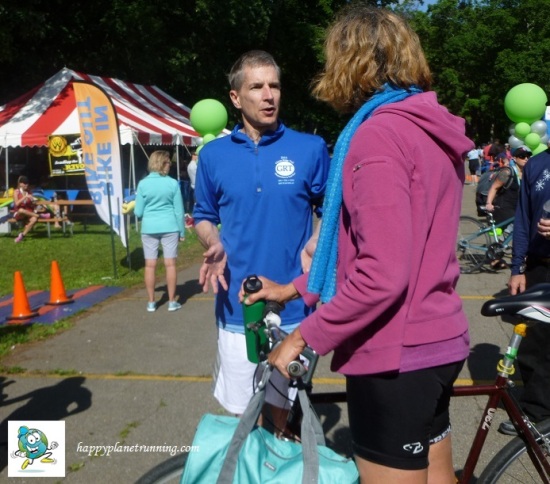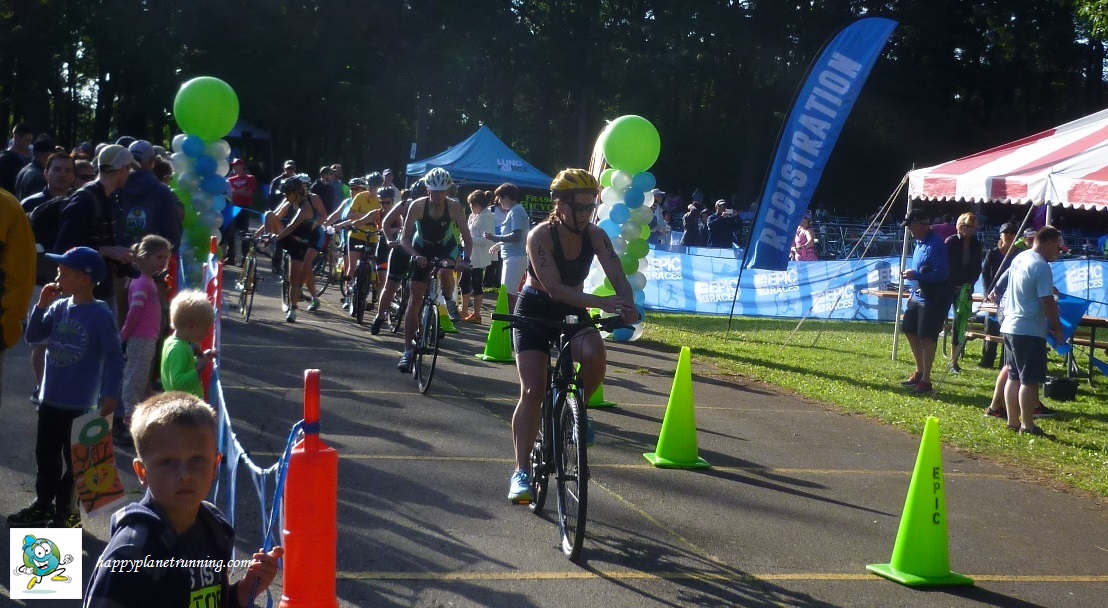Goddess Tri? Goddess(es) did! Have a great event, and recover a lot of waste, that is.
Sustainability Report: Tri Goddess Tri 2017
Date: June 25, 2017
Event company: Epic Races, Ann Arbor MI
Location: Portage Lake Recreation Area, Grass Lake MI
# Attendees: 450 athletes + staff + spectators
Zero Waste Team volunteers: 4
Race Overview
Tri Goddess is a set of short races for female athletes. Participants can choose among a full sprint or mini-sprint triathlon, a duathlon (run-bike-run), or aquabike (swim-bike). All races begin at 7:30 a.m. at the lake, and everything is wrapped up by 11:30. The post-race festivities are held in the finish area, with food, beer, music, and vendors offering clothing and massages.
The weather was cool and partly sunny, perfect conditions for a race, and there were a lot of spectators cheering on the athletes.

Zero Waste Plan
The post-race area was relatively small, so it was decided that two Zero Hero tents would be sufficient. They were set up to capture compostables, recyclables, and TerraCycle materials (chip bags and Gu/Clif wrappers). Since we expected minimal actual trash, I created bins for it but placed them behind the tents for use only if needed.

We set up bins in the beer tent area to collect the cups, and a bin at the finish line to hold plastic bags and medal wrappings. There was one aid stations on the course, which served water and Gatorade in cups.
Food was bananas, cookies, egg and cheese burritos, and potato chips, plus birthday cake celebrating one of the athletes turning 80(!). An outside vendor offered coffee drinks, which created a small complication; their cups were compostable but the lids were not, and they had to be put in separate waste streams.
Before the race began I removed or covered the park’s existing waste cans in the finish area, as they get used for everything if left there. This helped ensure we captured as much of the waste as possible.
Results
We achieved 93.8 percent landfill diversion and had less than 10 pounds of trash, most of which was single-use materials used for race setup as opposed to trash produced by the athletes.

Breakdown by waste stream:
- Compostables: 56.3 lbs. (35.2 %)
- Recyclables: 93.9 lbs. (58.6 %)
- Landfill: 9.9 lbs. (6.2 %)
What Went Right
For most of the race we had someone posted by each tent, allowing the ZW captain (Jeff) to check on the other bins and pre-sort as needed. As a result, the beer tent and finish area bins got under control (see below).
Repurposing the “Trash” space in the tents for chip bags and Gu wrappers worked very well, as we received much more volume from those than we did in trash.
We got a number of positive comments and thanks from the participants!

Opportunities for Improvement
Zero Waste was short-staffed during some of the post-race activity. Unattended bins filled up with food waste, recyclables, and trash, no matter what the signs on the bins said. We recovered, but one or two more available volunteers would have helped a lot.

There was more waste in certain areas than expected. A finish line bin set out for plastic bags and medal wrappings also got banana peels and water bottles. The cup collection bin in the beer tent also got food waste, which was remedied by adding a bin for compostables.
The food service items were a mix of recyclables and compostables. For example, burritos were served in foil, and the compostable coffee cups came with recyclable-only lids. Constant real-time sorting was needed to keep the waste streams in order. Moving to entirely compostable materials would make things easier for both volunteers and participants.
What We’ll Do Differently Next Time
The first year of a zero waste program is a learning experience for everyone involved. More on-site education would be helpful, such as additional “Zero Waste Event” signage, and a pre-race announcement to look for the proper bins for waste disposal.
Put a tent or extra bins at the finish line.
The race expo the day before had a pasta dinner that was served on Styrofoam plates. We have an opportunity to extend the Zero Waste program to the expo in future years.

